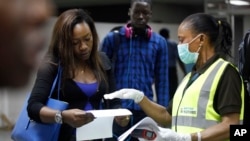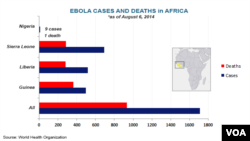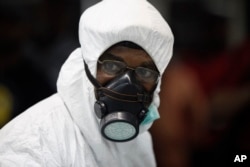The deadly Ebola outbreak on Wednesday showed new signs of spreading, as Nigeria confirmed a second death plus five new cases.
The new cases in Nigeria raise concerns that the virus will spread further in Africa's most populous nation, with its 174 million residents.
Meanwhile, Liberia has declared a state of emergency over the outbreak with its president saying the scale of the epidemic represented a threat to state security.
So far, the smaller and less populous countries of Liberia, Sierra Leone and Guinea have been the epicenters of the outbreak, which has claimed 932 deaths among more than 1,700 cases, the World Health Organization reported Wednesday.
Saudi Arabia reported it was investigating the suspicious death of a man who traveled through West Africa.
The World Health Organization will convene an ethics panel next week to discuss whether the experimental drug ZMapp should be given to some Ebola patients across West Africa.
Two American medical missionaries who contracted the Ebola virus in Liberia appear to be showing signs of improvement after doses of the experimental serum in recent days.
The drug has not been approved for, or tested on humans, and according to its manufacturer, there is only a very limited supply of the experimental drug.
If its use is recommended, the panel then will consider who should get the drug.
President Barack Obama said late Wednesday it was too early at this point to consider sending the drug to West Africa.
Nigerian officials said a nurse who treated the country's first Ebola patient two weeks ago died Tuesday of the disease. She was the first known Nigerian to have died from Ebola. The other victim was Patrick Sawyer, a Liberian-American who flew into Nigeria from Liberia with the disease. He was hospitalized in Lagos and died July 25.
The five other Nigerian patients are now in isolation at a Lagos hospital. All are health workers who treated Sawyer.
Nigeria is bracing for the possibility of more infections. Health Minister Onyebuchi Chukwu said the government is establishing a 24-hour-a-day Ebola command center and is trying to prepare hospitals around the country in case the disease spreads further.
“We need to work with each state government to establish isolation wards in readiness for any eventuality,” Chukwu said, noting the one in Lagos State would be strengthened and expanded.
Ebola suspected in Saudi death
Meanwhile, Saudi Arabia's official news agency reported that a suspected Ebola patient died in Jeddah on Wednesday despite two days of intensive hospital treatment. The man came down with symptoms of Ebola after a business trip to Sierra Leone.
Saudi health officials have sent tissue samples to laboratories abroad to confirm whether the deceased patient had been infected by Ebola.
Liberia prays for relief
In Liberia, where WHO has reported at least 282 deaths from the virus, President Ellen Johnson Sirleaf’s message to the nation Tuesday night boiled down to this: God help us.
“Relying on his divine guidance for our survival as a nation,” she said, “I call on all Liberians to observe three days of national fast and prayer to see God’s face, to have mercy on us and forgive our sins and heal our land.”
Beginning Wednesday, Liberians are to fast and pray from 6 a.m. to 6 p.m.
Sirleaf’s pronouncement has gotten mixed reactions in the capital, Monrovia. Some say it shows just how desperate the situation has become while others tell VOA it is an important step to keep people calm and unified.
Some had already heeded the president's call as of daylight Wednesday.
About 700 people, some dressed in white, gathered here at the Abundant Life Church Church on the outskirts of Monrovia.
“…The nation will survive. Hallelujah. Our country will emerge victorious over this incurable disease,” Pastor Varney Yarwo preached from the pulpit.
‘The Dark Week’
The Liberian health ministry said 94 people died of Ebola over seven days beginning July 27, in what its latest report calls "The Dark Week."
Daily life has ground to halt in much of Liberia. Police are protecting health workers and facilities as fear and frustration continue to breed hostility. The president has put nonessential government workers on mandatory leave, closed schools and told citizens to avoid large public gatherings.
That's all in the hope of reducing transmission of the disease, spread through bodily fluids, while health workers scramble to contain existing cases.
In neighboring Sierra Leone, considered the most dangerous zone of this regional outbreak, soldiers have deployed to the east to quarantine the most affected areas.
The government’s actions come amid reports that people there are not cooperating with efforts to isolate the sick and those who may have been exposed to the disease.
This week, the World Bank pledged up to $200 million in emergency funding to help Guinea, Liberia and Sierra Leone contain the outbreak, improve public health systems and help communities cope with the economic impact of the crisis.
American patients improving
Two American missionaries who contracted Ebola in Liberia are said to be improving after receiving an experimental treatment. Nancy Writebol and Kent Brantly are in a hospital isolation unit in the U.S. city of Atlanta. The U.S. Centers for Disease Control and Prevention says it is still too early to know whether the experimental drug, Zmapp, can save their lives.
The manufacturer of the drug, California-based Mapp Biopharmaceutical, said in a statement that very little of the drug is available but that the company is working with government agencies to increase production as quickly as possible.
VOA contributors to this report include Anne Look from Dakar, Senegal, Heather Murdock from Abuja, Nigeria, and Prince Collins.







